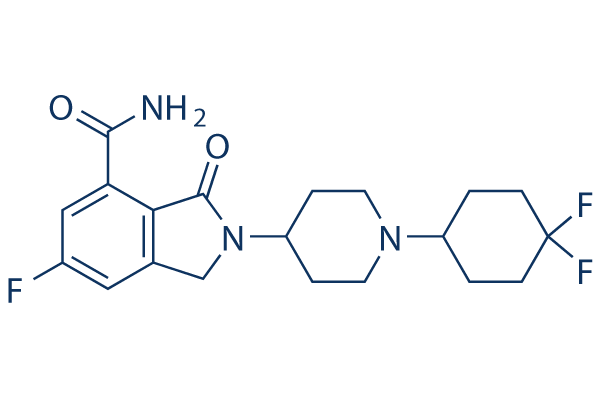All AbMole products are for research use only, cannot be used for human consumption.

In vitro: NMS-P118 is a potent (KD = 0.009 μM) PARP-1 inhibitor, showing 150-fold selectivity over PARP-2 (KD = 1.39 μM). The compound shows high solubility and permeability. In vivo: NMS-P118 is proved to be metabolically stable, it modestly inhibits two cytochrome P450 family members (CYP-2B6 IC50, 8.15 μM; CYP-2D6 IC50, 9.51 μM) out of eight isoforms tested. NMS-P118 has low in vivo clearance, and complete oral bioavailability. The pharmacokinetic profile of NMS-P118 in rat dosed iv at 10 mg/kg and orally at 10 and 100 mg/kg, mirrors that observed in the mouse, with oral bioavailability >65%, and linearity of exposure with dose. Its treatment dramatically decreases intratumoral PAR levels at 1, 2, and 6 h after administration and partial recovery of PAR levels is observed at 24 h. NMS-P118 shows excellent ADME and pharmacokinetic profiles, high oral availability in the mouse and rat, and high efficacy both as a single agent and in combination with Temozolomide in BRCA1-mutated MDA-MB-436 and BRCA2 deficient Capan-1 human tumor xenograft models, respectively.
| Cell Experiment | |
|---|---|
| Cell lines | HeLa cells |
| Preparation method | 6000 cells/well are seeded in 96-well plates in MEM/10% FCS and incubated for 24 h at 37℃, 5% carbon dioxide. Test compounds are then added at the required concentration for 30 min. DNA damage is then induced by adding hydrogen peroxide at the concentration of 0.1 mM for 15 min. Concentration curves are prepared in MEM/10% FCS from compound stocks in DMSO, and final DMSO concentration is 0.002% (v/v). Duplicate wells for each concentration point are prepared with a typical highest compound concentration of 20 μM and serial dilution 1:3. Plates are dried and fixed by adding cold methanol−acetone (70:30) solution for 15 min at room temperature, fixing solution is aspired, and wells are air-dried for 5 min and then dehydrated in PBS. Nonspecific binding sites are blocked by incubating wells for 30 min in PBS containing 5% (w/v) FBS 0.05% Tween 20. Wells are then incubated for 1 h at room temperature in PBS containing anti-PAR mouse monoclonal antibody diluted 1:200 in blocking solution. After three washes in PBS, wells incubate in PBS (w/v) 5% FBS 0.05% Tween 20 containing 2 μg/mL Cy2-conjugated Goat anti-mouse secondary antibody and 1 μg/mL DAPI. After washing further three times in PBS, cellular PAR immunoreactivity is assessed. |
| Concentrations | |
| Incubation time | 30 mins |
| Animal Experiment | |
|---|---|
| Animal models | Balb, Nu/Nu mice |
| Formulation | 10% Tween 80 in 5% dextrose |
| Dosages | 10 mg/kg |
| Administration | i.v. |
| Molecular Weight | 395.42 |
| Formula | C20H24F3N3O2 |
| CAS Number | 1262417-51-5 |
| Solubility (25°C) | 24 mg/mL in DMSO |
| Storage |
Powder -20°C 3 years ; 4°C 2 years In solvent -80°C 6 months ; -20°C 1 month |
| Related PARP Products |
|---|
| 2-Methylquinazolin-4-ol
2-Methylquinazolin-4-ol is a potent competitive poly(ADP-ribose) synthetase inhibitor, with a Ki of 1.1 μM. 2-Methylquinazolin-4-ol mammalian aspartate transcarbamylase (ATCase) inhibitor, with IC50 of 0.20 mM. |
| DPQ
DPQ is a potent PARP-1 inhibitor. |
| OUL232
OUL232 is a potent inhibitor of mono-ARTs PARP7, PARP10, PARP11, PARP12, PARP14, and PARP15. |
| AZ3391
AZ3391 is a potent inhibitor of PARP. |
| PARP1-IN-5
PARP1-IN-5 is a low toxicity, orally active, potent and selective PARP-1 inhibitor (IC50 =14.7 nM). |
All AbMole products are for research use only, cannot be used for human consumption or veterinary use. We do not provide products or services to individuals. Please comply with the intended use and do not use AbMole products for any other purpose.


Products are for research use only. Not for human use. We do not sell to patients.
© Copyright 2010-2024 AbMole BioScience. All Rights Reserved.
